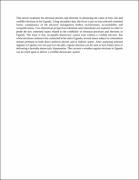| dc.contributor.author | Mwesigwa, David | |
| dc.date.accessioned | 2020-02-05T08:02:47Z | |
| dc.date.available | 2020-02-05T08:02:47Z | |
| dc.date.issued | 2020 | |
| dc.identifier.citation | Mwesigwa, D. (2020). Electoral Contestations and Credibility of Elections in Uganda. | en_US |
| dc.identifier.uri | https://hdl.handle.net/123456789/110 | |
| dc.description.abstract | This article examines the electoral process and elections in advancing the cause of free, fair and credible elections in the Uganda. Using secondary data, the focus is put on four selected contested issues: transparency of the electoral management bodies; inclusiveness; accountability and competitiveness. Two theoretical perspectives (Realism and Liberalism) are explored in order to probe the key contested issues related to the credibility of electoral processes and elections in Uganda. The irony is that, acceptable democracy cannot exist without a credible election. But while elections continue to be conducted in the entire Uganda, several issues subject to contestation remain pertinent to both direct political players and to indirect actors. After analysing selected regimes in Uganda over the past two decades, regular elections can be seen to have fallen short of delivering a desirable democratic dispensation. The concern is whether regular elections in Uganda can be relied upon to deliver a credible democratic system. | en_US |
| dc.language.iso | en | en_US |
| dc.publisher | South Asian Journal of Development Research (SAJDR) | en_US |
| dc.subject | Transparency | en_US |
| dc.subject | Credibility | en_US |
| dc.subject | Inclusiveness | en_US |
| dc.subject | Accountability | en_US |
| dc.subject | Competitiveness | en_US |
| dc.title | Electoral Contestations and Credibility of Elections in Uganda | en_US |
| dc.type | Article | en_US |

